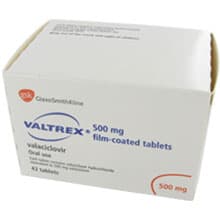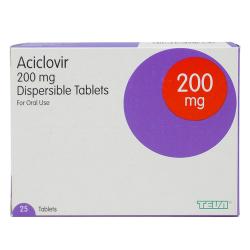Herpes Virus: start your consultation
- 1. Answer the online medical questions
- This helps our doctors to decide which treatment is safe for you.
- 2. Select your treatment
- You will see a list of recommended treatments. You can select the one you prefer.
- 3. Checkout and delivery
- Once you’ve completed the checkout, our doctors will review your answers. If all is safe, you will receive your treatment tomorrow.
Available Treatment(s)

- Effective treatment for the symptoms of HSV
- Buy Famvir online with no doctor's appointment
- Free next day delivery

- Heals painful lesions in just over 1 week
- Clears reoccurring lesions in under a week
- 65% of cases went outbreak-free for 6 months

- Clinically-proven herpes virus treatment
- Quickly tackles uncomfortable symptoms
- Treats and prevents future outbreaks

- Improves recovery time
- Reduces length of outbreak
- Treats genital herpes, cold sores and shingles
Herpes Virus
Causes and symptoms of the herpes virus
Herpes is the name for a group of contagious DNA viruses that can cause a number of different lifelong infections leading to genital herpes, cold sores and shingles. The herpes virus lies dormant in your system, sometimes for years at a time, before it becomes active again and causes a new outbreak of uncomfortable symptoms. The herpes virus is surprisingly common; it's responsible for causing chickenpox, which is why most people have a variant of the virus in their body. The chickenpox virus is called herpes zoster, and is a milder strain which can cause shingles in later life in a small number of people. Herpes simplex, which causes genital herpes and cold sores, is a less common but more serious infection. This virus is highly contagious and sexually transmitted, which is why it's becoming more widespread.
Treating these conditions as quickly as possible is essential for reducing pain and speeding up your recovery. Antiviral treatments, such as Aciclovir, Valtrex and Famvir, can help to alleviate the symptoms and push the herpes virus into a dormant state, decreasing the risk of you passing the virus on to others.
Cold sores
Cold sores are uncomfortable fluid filled blisters that appear most commonly on or around the mouth. Cold sores are caused by the contagious herpes simplex virus. Most people actually catch this virus as a child, but don't experience the symptoms until after puberty. Others can catch it through kissing, oral sex or by sharing a razor or toothbrush with someone who has the virus.
Most adult sufferers will experience the symptoms a few weeks after infection. The symptoms, if untreated, can last for up to two weeks before healing entirely. People will experience the virus differently; some may only experience symptoms once or twice a year whereas others may experience numerous outbreaks every year. However, treating cold sores with Famvir could assist in alleviating and fighting the symptoms.
Shingles
Shingles is an uncomfortable rash which is caused by the herpes zoster virus; the same virus that causes chickenpox. After chickenpox is alleviated, virus cells can become dormant within the body's nerve cells. For unknown reasons, the virus can be reactivated years later, producing the shingles rash on parts of the body.
Not everyone who caught chickenpox will experience shingles, and what causes it in certain people in later life is not really understood. Some sufferers may experience only a mild rash, while others can experience feverish symptoms, headaches and general malaise. Itching and feelings of pins and needles can occur on the body sometimes for weeks before a rash actually breaks out and nerve pain can continue for a while after the rash has disappeared.
Unlike other forms of herpes, shingles is not contagious and Valtrex is a popular treatment for dealing with the condition. However, if you've never suffered from chickenpox, you could catch this virus from someone with active shingles symptoms.
Genital herpes
Genital herpes is a highly infectious sexually transmitted disease caused by the herpes simplex strain. Genital herpes takes the form of uncomfortable and painful red sores, water blisters and ulcers that lie on and around the genitals, buttocks, thighs or anal opening. It is passed on through touch or contact with any active area, although in some cases these symptoms are not always visible.
The symptoms of genital herpes do not always appear right away. It's estimated that as many as 80% of people carrying the virus don't know that they have it and it may be years before they experience the symptoms. Others may be less lucky and will experience the symptoms soon after infection, with outbreaks occurring regularly during the first year of contracting the virus.
How do I treat the herpes virus?
Most people will be advised to use antiviral medications. There are three popular prescription medications for herpes: Aciclovir, Valtrex and Famvir. They can all be used to treat genital herpes, cold sores and shingles but the required dosage is different for each condition. These tablets are taken orally to help to reduce the uncomfortable symptoms of the herpes virus. These medications are often recommended for primary outbreaks.
Some people may find that over the counter medications such as ibuprofen are sufficient to relieve the feverish symptoms of the virus. In the case of genital herpes, it is advisable to wear cotton underwear to help the healing process of the sores. In some cases, the antiviral medications mentioned above can be used as a form of ongoing treatment to prevent regular outbreaks. It is important to note that there is currently no cure for the herpes virus, and any treatments or medications are intended to treat individual outbreaks and not to cure the virus that causes them.
medical form
medication
prescription
from pharmacy
